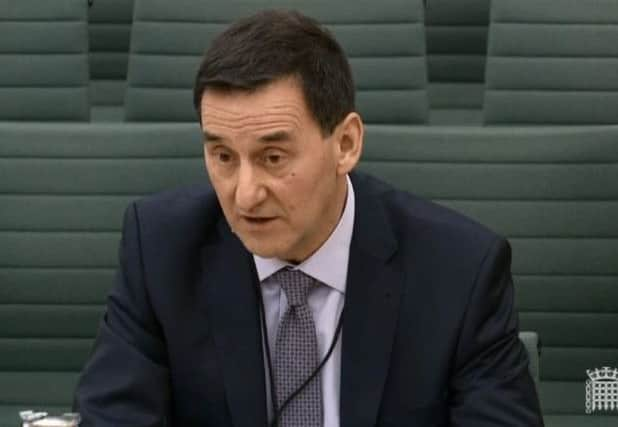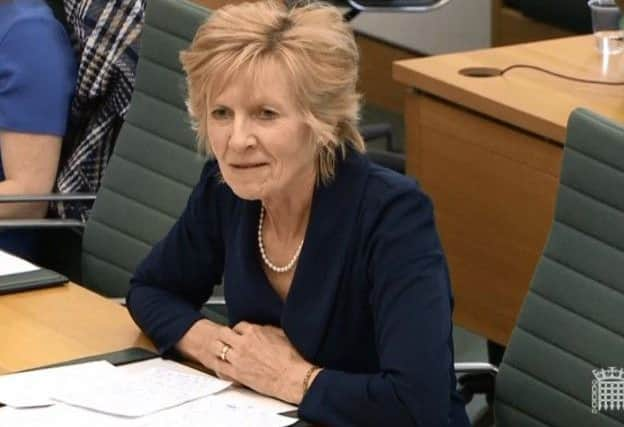Education: It is astonishing that we have nobody politically in charge and democratically accountable, says top civil servant
and live on Freeview channel 276
Giving evidence to the Northern Ireland Affairs Committee at Westminster, Department of Education permanent secretary Derek Baker said there are many key areas where vital decisions are not being taken because of the ongoing political impasse.
During the meeting, Mr Baker also spoke about the financial pressures facing many Northern Ireland schools, and revealed that going into the next financial year the department still has “unfunded pressures of £54 million”.
Advertisement
Hide AdAdvertisement
Hide AdResponding to a question from North Down MP Lady Sylvia Hermon about the impact the “prolonged absence of a functioning assembly and an education minister for over two years” has had on the department, Mr Baker stressed that there has been no education minister in place during his time in post.


“As a civil servant I find it astonishing that in a part of the United Kingdom we have nobody politically in charge of and democratically accountable for a service of such fundamental importance to the wellbeing of our society,” he said.
Asked if he was embarrassed by the situation, the permanent secretary said “no”, but added a personal point of view that “as someone who lives in Northern Ireland perhaps I am embarrassed.”
“I do find it quite wrong that an unelected civil servant like me – and I am accountable to nobody. I do not go to the electorate. I have no assembly committee to appear before to account for myself and my decisions. I have no assembly public accounts committee. There are no assembly debates going on on education issues and that is quite wrong. Personally I am very uncomfortable with it because I do not think I should be taking policy decisions and I try not to.”
Advertisement
Hide AdAdvertisement
Hide AdHe said it is “unfortunate” that Northern Ireland doesn’t have a group of ministers across departments taking the big resource allocation decisions.


Pointing to the fact that civil servants are not able to take many crucial decisions which is resulting in services in Northern Ireland falling behind those in the rest of the UK, Conservative MP Maria Caulfield MP asked Mr Baker how long he thought it would be before there are “significant risks” to pupils and teachers?
“I do recall the then head of the NI Civil Service in April 2017 saying we cannot go without an executive beyond July 2017, and here we are in March 2019 without an executive,” Mr Baker replied.
“We are muddling through and will continue to muddle through. There is no right answer to how long this can go on, but there is no question that important policy decisions are not being taken.
Advertisement
Hide AdAdvertisement
Hide Ad“I would hope there would be no risk to children because I will do whatever is necessary to ensure there no physical risk or harm coming to teachers or to children.”
Highlighting one particular example where the lack of an executive is significantly impacting people in Northern Ireland, Mr Baker continued: “Childcare policy is really important for the benefit of our community in economic terms and in social terms, but childcare strategy is going nowhere in Northern Ireland in the absence of an executive and that is hugely unfortunate.”
Referring to proposed changes to the education estate – school closures, mergers or expansions – he added: “I can take decisions, but a minister really needs to be front and centre in driving that forward and driving it forward with his or her colleagues to have real impact on transformation. There is no right answer to it (how long it might go on), but it is debilitating.”
He said other areas where ministerial approval is required include making crucial appointments to bodies such as the Youth Council and examinations body CCEA.
Advertisement
Hide AdAdvertisement
Hide AdMr Baker said the department reports regularly to the Northern Ireland Office about the impact of not having ministers and the areas where that is creating difficulties.
Other issues raised during the meeting included budget pressures and financial hardships facing many Northern Ireland schools and the need to deal with the ongoing dispute around teachers’ pay – something which is having a knock on effect on vital areas such as school inspections.
Mr Baker revealed that going into the next financial year the department still has “unfunded pressures of £54 million”, the “lion’s share” of which is the anticipated rise in pay next year for the department’s 43,000 full time equivalent employees.
“The system has to absorb those pay pressures for a fifth year in a row, and that it why schools are saying they are finding it more and more difficult to balance the books and more and more schools are falling into deficit,” he explained.
Advertisement
Hide AdAdvertisement
Hide AdOther matters raised by MPs with Mr Baker and his colleagues Fiona Hepper (deputy secretary for education policy and children’s services) and Gary Fair (director of finance) included the growing cost of special needs education provision, the impact of confidence and supply funding on the education budget and an update on the progress made in terms of the £500m of allocating ‘Fresh Start’ funding for integrated and shared schools projects.